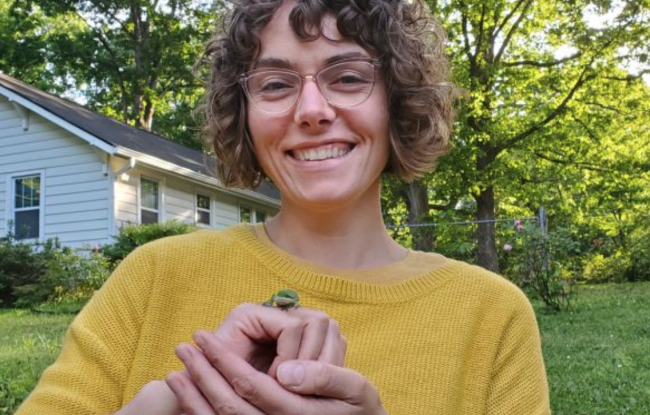You have /5 articles left.
Sign up for a free account or log in.

Cody Luedtke
Cody Luedtke/GoFundMe
Numerous professors already have resigned this semester over concerns about how their administrations are handling COVID-19. And while these faculty departures have happened under duress, they’ve still essentially been resignations.
Not so for Cody Luedtke, who was until last week a lab coordinator and instructor of life and earth sciences at Georgia State University: the institution fired her for refusing to teach in a classroom without a mask mandate in place.
Luedtke, who is now unemployed, set up a Go Fund Me page to help pay for her housing and health insurance, and to share her story.
“I was a lab coordinator, a staff/faculty fusion job that enabled me to teach two classes per semester while managing our teaching labs,” Luedtke wrote on the page. “I worked at GSU for almost six years. As I prepared for the semester to begin, I realized that teaching in this environment would be crossing a boundary for me.”
Luedtke said she “couldn't stop thinking about the safety of my students, their families, and the community.” Yet professors “are forbidden from requiring masks in their classrooms or inquiring about vaccination status of students.”
According to a policy the University System of Georgia adopted in May, “vaccinated individuals can resume campus classes and other activities without wearing a mask. Unvaccinated individuals are strongly encouraged to continue wearing a face covering while inside campus facilities.”
In July, the system -- which includes Georgia State and 25 other institutions -- updated its guidance to say the system urged “all students, faculty, staff and visitors to get vaccinated either on campus or with a local provider. Additionally, everyone is encouraged to wear a mask or face covering while inside campus facilities.”
Encouraging masks and vaccines isn’t the same thing as requiring them, of course. And without masks, Luedtke wrote, “in a state with less than half of its residents fully vaccinated, I knew there was a good chance that there would be transmission of COVID-19 in my classroom.” She said she worried that students -- many of whom are from racial and ethnic minority groups that have been disproportionately affected by COVID-19 -- would go home to their families, who might be unvaccinated, and who might end up in “overtaxed hospitals” and “cared for by overworked nurses.”
As of Tuesday afternoon, some 5,377 people were hospitalized with confirmed cases of COVID-19 in Georgia, almost as many as the state’s pandemic peak for hospitalizations in January, according to information from the Georgia Emergency Management and Homeland Security Agency.
Ultimately, and “morally,” Luedtke said, she couldn’t “justify teaching face-to-face under those circumstances without a mask mandate, and I refused to be complicit in the USG’s reckless policy decisions regarding COVID-19.” She said she “respectfully refused” to teach in an environment that she couldn’t make “safe” for her students, and she was “fired before the end of the week.”
Georgia State, which underscored that it is following system policy on masking and vaccines, confirmed that Luedtke was terminated for her “refusal to work.”
Andrea Anne Jones, a university spokesperson, said that Georgia State has a remote work policy and accommodation process under the Americans With Disabilities Act. But Luedtke wasn’t eligible for the remote policy and did not seek an ADA accommodation, Jones said.
Luedtke said that she does not expect to be able to collect unemployment because state law prevents terminated workers from doing so if they are “at fault.” She is hoping to raise $2,500 on her page. She’d already reached half that amount Tuesday.
Some fellow faculty members from public institutions in Georgia donated. “I know how awful things are right now,” wrote one professor who did not consent to being quoted by name. “I’m so sorry our university system has turned on us.”
Matthew Boedy, an associate professor of rhetoric and composition at the University of North Georgia and president of the American Association of University Professors’ Georgia conference, said conditions in that state “will get worse,” as Georgia campuses didn’t see their numbers spike until two to four weeks into the semester last fall.
“It has been made clear over the last few weeks that there is no number of cases too high for the [system’s] Board of Regents to reverse course,” he said. “They and the governor have let a fourth wave come for the children. It is a hellscape here in Georgia.”





